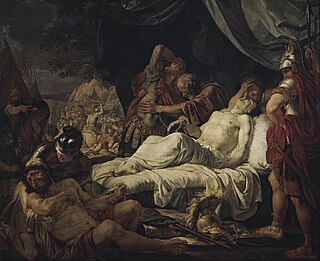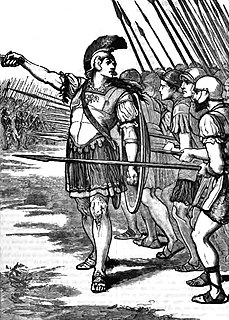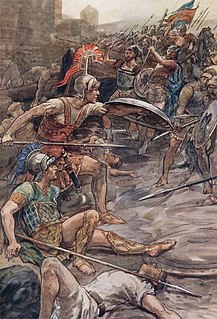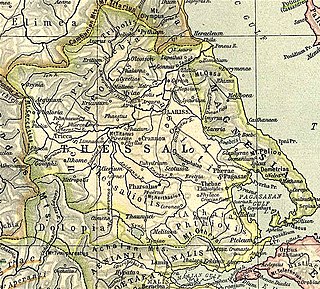Related Research Articles
Alexander was Tyrant or Despot of Pherae in Thessaly, ruling from 369 to c. 356 BC. Following the assassination of Jason, the tyrant of Pherae and Tagus of Thessaly, in 370 BC, his brother Polydorus ruled for a year, but he was then poisoned by another brother, Alexander. Alexander governed tyrannically and was constantly seeking to control Thessaly and the kingdom of Macedonia. He also engaged in piratical raids on Attica. Alexander was murdered by the brothers of his wife, Thebe, as it was said that she lived in fear of her husband and hated Alexander's cruel and brutal character.
This article concerns the period 379 BC – 370 BC.
This article concerns the period 369 BC – 360 BC
This article concerns the period 359 BC – 350 BC.

Thebes is a city in Boeotia, central Greece. It played an important role in Greek myths, as the site of the stories of Cadmus, Oedipus, Dionysus, Heracles and others. Archaeological excavations in and around Thebes have revealed a Mycenaean settlement and clay tablets written in the Linear B script, indicating the importance of the site in the Bronze Age.
Year 358 BC was a year of the pre-Julian Roman calendar. At the time, it was known as the Year of the Consulship of Ambustus and Proculus. The denomination 358 BC for this year has been used since the early medieval period, when the Anno Domini calendar era became the prevalent method in Europe for naming years.
Year 369 BC was a year of the pre-Julian Roman calendar. At the time, it was known as the Year of the Tribunate of Fidenas, Cicurinus, Cossus, Cornelius, Cincinnatus and Ambustus. The denomination 369 BC for this year has been used since the early medieval period, when the Anno Domini calendar era became the prevalent method in Europe for naming years.

Epaminondas was a Greek general (Strategos/Boeotarch) of Thebes and statesman of the 4th century BC who transformed the Ancient Greek city-state of Thebes, leading it out of Spartan subjugation into a pre-eminent position in Greek politics called the Theban Hegemony. In the process he broke Spartan military power with his victory at Leuctra and liberated the Messenian helots, a group of Peloponnesian Greeks who had been enslaved under Spartan rule for some 230 years after being defeated in the Messenian War ending in 600 BC. Epaminondas reshaped the political map of Greece, fragmented old alliances, created new ones, and supervised the construction of entire cities. He was also militarily influential and invented and implemented several major battlefield tactics.

Pelopidas was an important Theban statesman and general in Greece, instrumental in establishing the mid-fourth century Theban hegemony.

The Battle of Leuctra was a battle fought on 6 July 371 BC between the Boeotians led by the Thebans, and the Spartans along with their allies amidst the post-Corinthian War conflict. The battle took place in the neighbourhood of Leuctra, a village in Boeotia in the territory of Thespiae. The Theban victory shattered Sparta's immense influence over the Greek peninsula, which Sparta had gained long before its victory in the Peloponnesian War a generation earlier.
Alexander II of Macedon was an Argead king of the ancient kingdom of Macedon in 369-367 BC, following the death of his father Amyntas III.
Charidemus, of Oreus in Euboea, was a Greek mercenary leader of the 4th century BC.

The Theban hegemony lasted from the Theban victory over the Spartans at Leuctra in 371 BC to their defeat of a coalition of Peloponnesian armies at Mantinea in 362 BC, though Thebes sought to maintain its position until finally eclipsed by the rising power of Macedon in 346 BC.

Classical Greece was a period of around 200 years in Greek culture. This Classical period saw the annexation of much of modern-day Greece by the Persian Empire and its subsequent independence. Classical Greece had a powerful influence on the Roman Empire and on the foundations of Western civilization. Much of modern Western politics, artistic thought, scientific thought, theatre, literature and philosophy derives from this period of Greek history.
The Thessalian League was a loose confederacy of feudal-like city-states and tribes in the Thessalian plain in Greece. The seat of the Thessalian diet was Larissa.

The Boeotian or Theban War broke out in 378 BCE as the result of a revolt in Thebes against Sparta. The war saw Thebes become dominant in the Greek World at the expense of Sparta. However by the end of the war Thebes’ greatest leaders, Pelopidas and Epaminondas, were both dead and Thebes power already waning, allowing for the Rise of Macedon

Under the reign of Philip II, the kingdom of Macedonia, initially at the periphery of classical Greek affairs, came to dominate Ancient Greece in the span of just 25 years, largely thanks to the personality and policies of its king. In addition to utilising effective diplomacy and marriage alliances to achieve his political aims, Philip II was responsible for reforming the ancient Macedonian army into an effective fighting force. The Macedonian phalanx became the hallmark of the Macedonian army during his reign and the subsequent Hellenistic period. His army and engineers also made extensive use of siege engines.

The Theban–Spartan War of 378–362 BC was a series of military conflicts fought between Sparta and Thebes for hegemony over Greece.

Scotussa or Skotoussa was a town and polis (city-state) of Pelasgiotis in ancient Thessaly, lying between Pherae and Pharsalus, near the frontiers of Phthiotis. Scotussa is not mentioned in Homer, but according to some accounts the oracle of Dodona in Epirus originally came from this place. In 394 BCE, the Scotussaei joined the other Thessalians in opposing the march of Spartan king Agesilaus II through their country. In 367 BCE, Scotussa was treacherously seized by Alexander of Pherae, tyrant of the neighbouring town of Pherae.
Cynoscephalae was the name of a range of hills in ancient Thessaly, a little to the south of Scotussa, in whose territory they were situated. They are described by Polybius as rugged, broken, and of considerable height; and are memorable as the scene of two battles: Battle of Cynoscephalae, between the Thebans and Alexander of Pherae, in which Pelopidas was slain; and Battle of Cynoscephalae, of still greater celebrity, in which Philip V of Macedon was defeated by the Roman consul Titus Quinctius Flamininus.
References
- ↑ "Ancient Greek civilization - Theban expansion". Encyclopedia Britannica. Retrieved November 2, 2020.
- ↑ "Philip II of Macedon". Biography. Retrieved November 2, 2020.
- ↑ "Alexander Of Pherae | Greek ruler". Encyclopedia Britannica. Retrieved November 2, 2020.
- ↑ Percy, William Armstrong; Percy, William Armstrong (1998). Pederasty and Pedagogy in Archaic Greece. University of Illinois Press. ISBN 978-0-252-06740-2.
- ↑ "King Cotys I | Ancient Treasures, Ancient Thracians" . Retrieved November 2, 2020.
- ↑ "Pelopidas | Theban statesman". Encyclopedia Britannica. Retrieved November 2, 2020.